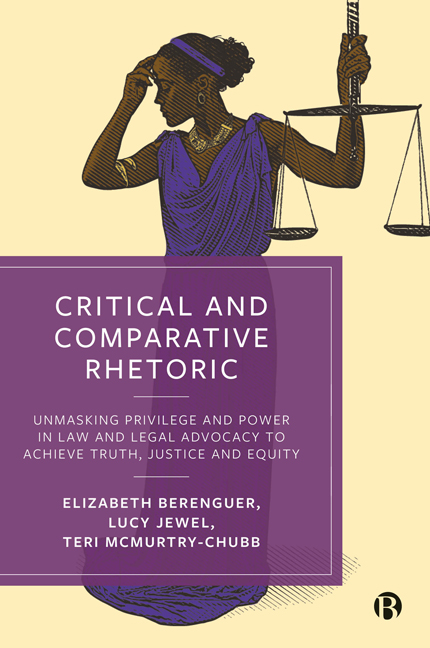 Critical and Comparative Rhetoric
Critical and Comparative Rhetoric Book contents
- Frontmatter
- Contents
- Detailed Contents
- List of Figures and Tables
- About the Authors
- Introduction
- 1 What’s Wrong with Aristotle?
- 2 Problematizing Aristotle: Renovating and Remodeling Traditional Legal Rhetoric
- 3 Shifting the Focus from the West
- 4 Multicultural Rhetorics
- 5 Reproducing the Canon, Reproducing Inequity (Traditional Rhetoric)
- 6 Interrupting the Canon
- 7 Disrupting the Canon: Multicultural Rhetorical Strategies in Action
- References
- Index
Introduction
Published online by Cambridge University Press: 18 January 2024
- Frontmatter
- Contents
- Detailed Contents
- List of Figures and Tables
- About the Authors
- Introduction
- 1 What’s Wrong with Aristotle?
- 2 Problematizing Aristotle: Renovating and Remodeling Traditional Legal Rhetoric
- 3 Shifting the Focus from the West
- 4 Multicultural Rhetorics
- 5 Reproducing the Canon, Reproducing Inequity (Traditional Rhetoric)
- 6 Interrupting the Canon
- 7 Disrupting the Canon: Multicultural Rhetorical Strategies in Action
- References
- Index
Summary
Through the lenses of comparative rhetoric and critical rhetoric, this book theorizes how alternative approaches to communication can transform legal meanings and legal outcomes, infusing them with more inclusive participation, more equity, and more justice. This book views legal language through a radical lens, setting aside long-standing norms that derive from White and Eurocentric approaches to argument and resituating legal methods as products of different rhetorical models that come from diasporic and non-Western cultures. From the outset, this book urges readers to rethink how they think about logic and rhetoric and to consider other ways of building knowledge that can heal the law's ailing thought structures that often perpetuate and reinforce systems of privilege and power.
This book challenges some deeply entrenched foundations relating to logic and rhetoric. In doing so, we recognize that some of the material we present requires introspection and a patient mind. For instance, Western rhetoric and logic rely on a speaker orientation, the view that the speaker is held accountable for making meanings clear. This is, however, a relatively arbitrary construct; many other cultures, especially Eastern cultures, preserve a listener orientation, where it is up to the listener to work to understand the nuances and subtleties of the message. In engaging with this book, we ask readers to adopt a listener orientation when working to understand this challenging new discipline.
The three authors of this volume are all veteran teachers, scholars, and practicing attorneys (we all have active law licenses). Our deep familiarity with theory, pedagogy, and law practice uniquely situates us to discuss the Five Ws and How of critical and comparative rhetoric. Who— this book will discuss who has historically been imbued with the power to engage in lawmaking speech and who has historically constructed the rules of the game. Where— we will center geopolitical issues by explaining that, in a number of ways, White European settlers created modern legal processes to support colonial and capitalistic systems built upon enslavement, oppression of indigenous peoples, and imperial domination.
- Type
- Chapter
- Information
- Critical and Comparative RhetoricUnmasking Privilege and Power in Law and Legal Advocacy to Achieve Truth, Justice, and Equity, pp. 1 - 8Publisher: Bristol University PressPrint publication year: 2023


